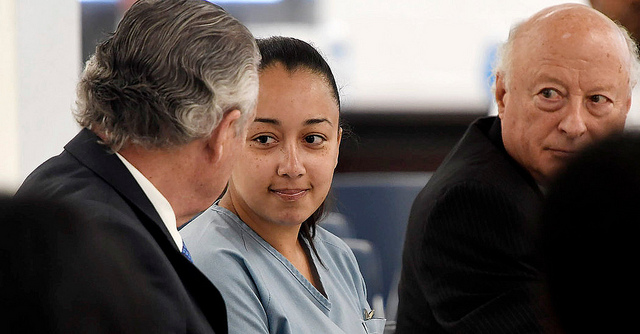What Clemency for Cyntoia Brown Means for Other Victims Of Child Abuse
Cyntoia Brown became a household name after reality-TV star Kim Kardashian, as well as other celebrities like Rihanna, Snoop Dogg, and T.I., used social media to call on Tennessee officials to grant her clemency. She had been sentenced to life in prison after killing a man who had picked her up for sex when she was just 16 years old.
Brown had already served 14 years in prison when, in 2017, her story became widely known online, and, thanks to the pressure, Tennessee Gov. Bill Haslam finally granted her clemency this year. Brown is now scheduled to be released to parole supervision on Aug. 7.
In a statement announcing his decision, Haslam said he had carefully considered the case after learning about its tragic nature.
“Cyntoia Brown committed, by her own admission, a horrific crime at the age of 16. Yet, imposing a life sentence on a juvenile that would require her to serve at least 51 years before even being eligible for parole consideration is too harsh, especially in light of the extraordinary steps Ms. Brown has taken to rebuild her life. Transformation should be accompanied by hope,” he added.
In 2004, when Brown was 16, Johnny Mitchell Allen took her to his house after soliciting her for sex. Reportedly afraid for her life because of his behavior, she shot him in the head while he was asleep, took money and weapons, and then jumped in his truck and fled the scene. At the time, she said she took the money because she feared going back to her pimp, named Cut Throat, empty-handed.
After being tried as an adult, she was convicted of both murder and robbery. At the time, the jury wasn’t made aware that Brown suffered from fetal alcohol syndrome. But perhaps they also missed the most important part of her backstory: she had been dragged into a life of crime thanks to her pimp, who had raped her and forced her into prostitution at a young age.
“I made him money,” she recounted in a documentary about her case. “He wasn’t going to let me go nowhere. He told me he’d kill me.”
The fact that Brown was convicted before juvenile sentencing guidelines in Tennessee changed made her case even more heartbreaking. After all, Brown wouldn’t have been tried the same way under the current system.
“Our courts today would view her as a child sex slave,” CNN affiliate WZTV’s anchor Stacy Case said after investigating sex trafficking in the state. “She would be viewed as a victim.”
Brown’s Case Could Change How the State Treats Girls Like Her
Following Haslam’s decision, Tennessee Governor-elect Bill Lee issued a statement saying that while her case was “complex,” he hoped “that positive dialogue will come from this decision as our state moves forward.”
He was one of many of the state’s politicians and religious leaders who reacted positively to Brown’s clemency. Even Lt. Gov. Randy McNally issued a statement showing he agrees that “human trafficking is a horrible scourge that needs to end.”
Republican state legislator Jeremy Faison also tweeted following the news, saying he hopes to be there at the Tennessee Prison for Women on Aug. 7 when Brown is released.
“Sometimes the very best part of justice is mercy,” Faison said.
With the movement for criminal-justice reform picking up steam thanks to stars like Kardashian and now even President Donald Trump, whose extra push helped to get the FIRST STEP Act through Congress, cases like Brown’s remind us that there’s still a lot of work to be done.
However, we’ve come a long way and must celebrate her as she’s given her freedom back after more than a decade behind bars after a life of violence and despair. As Rev. Jeannie Alexander, director of the No Exceptions Prison Collective group, said, clemency for Brown is not just about Brown.
“People evolve and change, and everyone has a story.”
Alexander wants all other juveniles to be given a second chance.
“It’s time for the legislature to do the right thing,” the advocate said, explaining that the state’s lawmakers should finally pass legislation to offer relief for juveniles and others facing life in prison “as part of comprehensive sentencing reform.”
While Brown’s case isn’t the same as others involving nonviolent offenders convicted of drug-related offenses, her story highlights the injustice of a criminal justice system that has learned to ignore the case’s background, instead choosing a one-size-fits-all approach to all cases.
Just like drug cases, which often lead to sentences that do not fit the crime, Brown’s case could serve as an important precedent, helping Tennessee’s victims of rape and child abuse in the long run.










